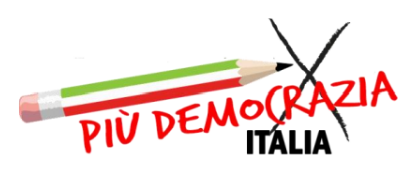Home › Forums › 7 – Attività ed interventi di Più Democrazia Italia e cooperazioni con altri. › Conferenza sul futuro dell’Europa › Rispondi a: Conferenza sul futuro dell’Europa
Bozza intervento:
= = =
Dear friends,
Thank you to everybody for the work and for the organisation of the event of today.
We absolutely need to manage events like this of today and not only today but also in the future.
In this way we will reach
to definitively overcome the past, namely: the nationalist egoism, that is briefly said nationalism.
Let me report a few words
from the document: the Ventotene manifesto.
“A nation has become a divine entity, an organism that must think only of its own
existence and development, without in any way taking care of damages that others may suffer. The absolute sovereignty of the
nation states has produced the will to dominate others . . ..
This desire for domination can not be calmed otherwise than in
the hegemony of the state stronger than all the others who should be enslaved.”
The Ventotene manifesto was written in 1941, by anti-fascist prisoners, imprisoned on the island of Ventotene.
The document
is generally believed to be the ideological foundation of the European community.
It is very interesting to note that the
same concepts, expressed with similar words, are also present in the text written many decades later by another prisoner:
the Kurdish leader Ochalan.
Hear what Abdulla Ochalan writes from his prison:
“When analysing the theory of nation, another
aspect that needs to be critically evaluated is the sacralisation and deifica-tion of the nation. Capitalist modernity has
replaced traditional religion and god and constructed the deified nation-state. If we interpret nationalism as the religion
of the nation-state, then we can perceive the nation-state itself to be the god of this religion.
. . .
The reason behind it being excessively charged with violence is due to the capitalist system’s tendency for maximum profit
and uninterrupted accumulation. Without an organisation of violence like the nation-state, the laws of capitalist accumulation
could not operate and industrialism could not be maintained.
. . .
The sovereignty of the nation-state is not only the cause of
societal problems, but is also the main obstacle in the way of solutions”.
These are sentences of the text entitled:
“the democratic nation”, and which refers to a complex and difficult situation such as the war in Syria.
Ochalan, from his prison,
makes explicit reference to the European community as an example of overcoming the nation-state.
The continuity and
the coherence between the texts of Spinelli and Ochalan, in their Storic and geographical distance are a signal:
the overcoming of the national egoism and therefore of the nationalism is a planetary requirement.
We European citizens we have the responsibility and the need to offer not only to ourselves, but to the whole world the solution
and the example of overcoming the ancient divinity called the nation-state (Ochalan).That divinity has demanded human sacrifices over
the millennia.
How to take charge of our responsibility? How to fulfill our task?
We need to work hard to continue the work,
that only just begun, to build and structure in democratic form the European Union.
What is missing in Europe?
Is missing the materialization of the original ideals described in Ventotene’s manifesto (and the orginal ideals are reaffirmed
by Ochalan, from its prison and from the context of a terrible war).
As a consequence of this lack, Europe is not a Europe of peoples,
but a Europe of nationalist states.
and this poses a serious and evident danger, the danger that the European citizens are losing
confidence in Europe and are moving away from the project.
What is missing in Europe?
An agreement between European citizens on the
structure and rules of the new coexistence is missing.
An European constitution shared by European citizens because it is made by themselves is missing.
How to achieve what is missing?
We need a “Conference on the future of Europe”.
Dear friends, I would like to go on and describe
how collective decisions can be made, using modern communication tools.
I lived the experience of organizing the drafting of
shared texts, drawn up with the consent method: the text was approved only when everyone agreed even starting from very
different initial positions:
there were only 500 people in the group, much less than the 500 million European citizens.
But the end results were always much better than what the best of the participants alone would have managed to achieve.
That experience, even if limited in relation to the task we have to face now, can however serve to structure the city assemblies
in the future.
I gladly remain at your disposal for further clarifications on the subject.
-
Questa risposta è stata modificata 3 anni, 11 mesi fa da
Leonello Zaquini.
